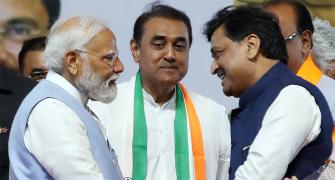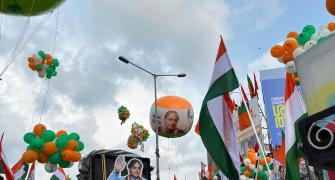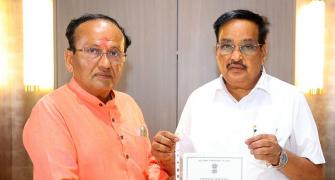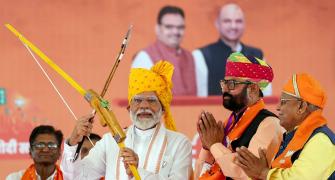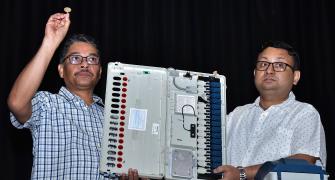As prime minister and the most powerful politician in India today, you would think Atal Bihari Vajpayee would be able to have his way, at least where his own feelings are concerned.
But no. When he finally filed his nomination papers for re-election from the Lucknow Lok Sabha constituency today, Vajpayee said he was not inclined to contest this time. 'There should be a limit to fighting elections,' he said.
Why then is he contesting at the not-so-young age of 79, you may wonder.
Blame it on the Bharatiya Janata Party. Blame his allies. They just did not want to let the prime minister take a well-deserved break.
On second thought, don't blame them. Who in their right mind would want to let go of the biggest single advantage that they have over their rivals?
Sceptics and opponents will, of course, scoff and say that Vajpayee is much more than just the National Democratic Alliance's biggest advantage. He is quite simply the glue that holds the coalition together.
But that may not be true any longer, with Deputy Prime Minister L K Advani making consistent and conscious attempts to change his image from that of a hardliner to a moderate politician who can take all shades of opinion along.
And, for the first time on Thursday, Vajpayee also revealed that the BJP has arrived at a consensus as to who will replace him when he demits office.
Vajpayee, of course, did not say who that worthy will be. That is a party secret, to be revealed only when the time comes.
But for those who have been following politics for some time, it cannot be too hard to guess the successor's name.
The Congress, meanwhile, must be cursing itself for having been taken in by Ram Jethmalani's rhetoric about taking on Vajpayee. The nation's finest criminal lawyer had first said he would contest the Lok Sabha election against the prime minister provided the entire Opposition backed him.
That did not happen with both the Samajwadi Party and the Bahujan Samaj Party, the two biggest players in Uttar Pradesh, fielding their own candidates. But the Congress and the Left parties decided to take up Jethmalani's offer and the maverick was happy enough to enter the fray.
Then came a googly from Vajpayee -- an 'appeal' to his 'old friend' to avoid a contest. 'Since this is likely to be the last election in which we will be active participants, I expect that he will reconsider his decision,' Vajpayee said.
Suddenly the Congress realised it could find itself without a candidate in the country's most important constituency.
Not that the Congress thinks it will win the battle. But the importance of the symbolism of opposing the PM's candidature cannot be overemphasised for the country's leading Opposition party.
And so on Thursday, the last date for filing nominations for the constituency, the party quietly asked Rajya Sabha member Akhilesh Das, who was earlier supposed to have been Jethmalani's campaign manager, to be its candidate.
Ever heard of misfortune bringing someone great luck?
When the Congress asked disgraced former Chhattisgarh chief minister Ajit Jogi to take on arch-rival and permanent defector V C Shukla in his family bastion Mahasamund, it seemed like an impossible task.
Until Jogi's luck ran out. And the balance tilted.
Late last Sunday Jogi's car met with an accident in a jungle 135 km from the state capital Raipur while on the campaign trail. The Congress politician was badly wounded and had to be rushed to Mumbai for emergency treatment.
He is now stable and reported to be out of danger, but there's almost no chance that he will be able to walk again before polling day.
But that one stroke of bad luck just changed the tempo of his campaign. The party, which was earlier divided on his candidacy, has rallied solidly behind Jogi and is out in strength doing what it does best -- milking the people's sympathy.
Even Prime Minister Vajpayee cancelled an election meeting that he was to address in support of Shukla, saying he did not want to campaign against Jogi when the latter was fighting his own battle in hospital.
Thursday his wife Dr Renu Jogi, who resigned two days ago as associate professor of ophthalmology at the Raipur Medical College, arrived in Mahasamund to take charge of the election campaign from their son Amit, who had been holding fort.
In just a couple of days the tide has turned. Suddenly it is Shukla who appears to be fighting an uphill battle now.
Chandra Shekhar fancies himself as the elder statesman of Indian politics. That much is clear from his performance in the Lok Sabha, where he usually intervenes to bemoan the level of debate and exhort his fellow parliamentarians to do better by their constituents and to live up to their aspirations and ideals.
At such times it is hard not to agree with him. At other times it is hard to understand what he is saying.
No one can deny that the level of political discourse has deteriorated since the heady early days of Independence. But the former prime minister believes this deterioration can be traced back to the great Congress split of 1969, when Indira Gandhi took on the party bosses who were collectively known as the Syndicate.
Releasing the autobiography of the late Acharya J B Kripalani, a close associate of Mahatma Gandhi and Congress president from 1946 to 1948, Chandra Shekhar said, 'When I was a young parliamentarian, he [Kripalani] had told me that I should not try to improve the Congress or it would break.
'That, Kripalani had said, would be bad for the country as the Congress had played a historic role.'
Kripalani himself left the party in 1951, but clearly he still had a soft spot for the organisation.
Within a year of his warning, however, the Congress split. This, said Chandra Shekhar, was when 'deterioration' crept into Indian politics and 'it is increasing with time.'
When the new-born Janata Party assumed power in 1977, Chandra Shekhar said he proposed that Kripalani be made President of India, but the idea had to be dropped after protests against the ex-Congressman. 'That,'he said, 'heralded the entry of the politics of revenge into our hearts.'
All the chronology may be fine, but a couple of things remain unclear. If the Congress was in need of improvement, doesn't that mean it was already deteriorating in the 1960s? And why would people in the Janata Party oppose a former Congressman when most of the Janata Party itself was composed of former Congressmen, including Prime Minister Morarji Desai himself?


